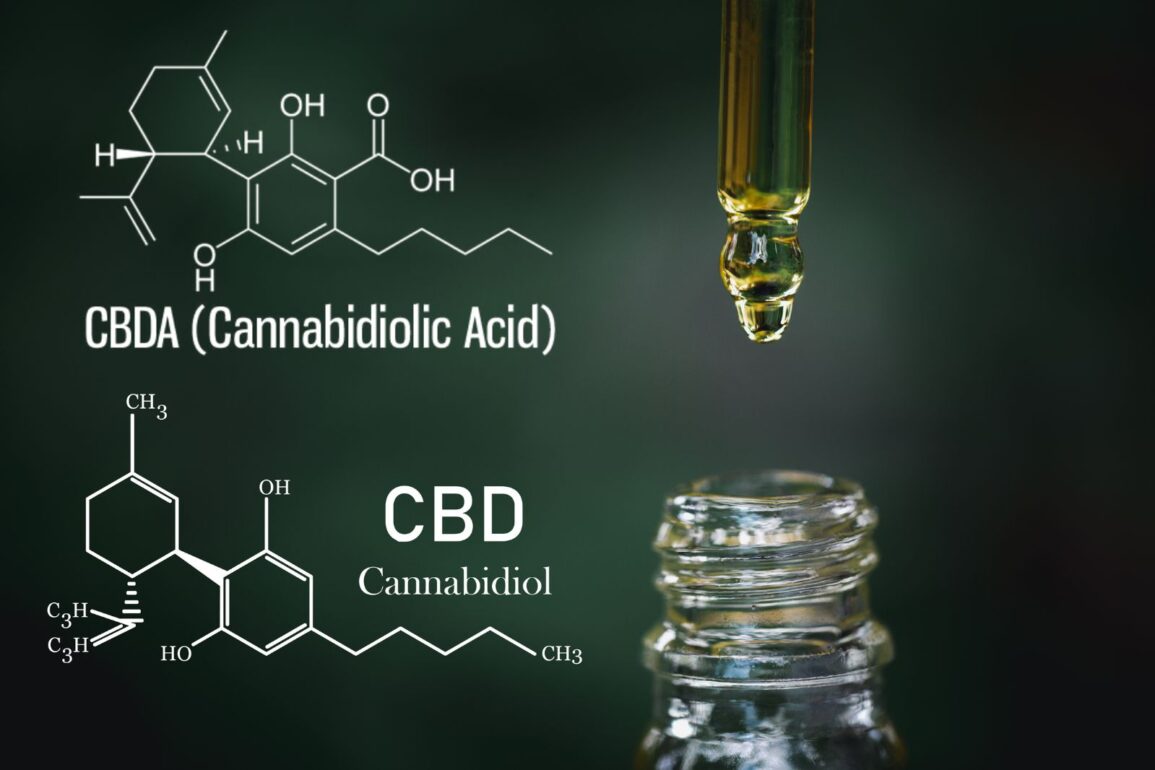CBD (cannabidiol) and CBDA (cannabidiol acid) are two compounds that belong to the family of cannabinoids found in the cannabis plant. While they share a similar molecular structure, they possess distinct properties and potential benefits due to their different forms and interactions within the body.However, further research is needed to fully understand what is the difference between CBD and CBDA.
Table of Contents:
- Chemical Structure:
- Form and Bioavailability:
- Potential Benefits:
- Biochemical Interaction:
- What is CBDA?
- How Does CBD Affect the Body?
- How Does CBDA Affect the Body?
- CBD vs. CBDA: How to Use CBD and CBDA
- Where Does CBD Come From?
- What Does CBDA Do?
- Is CBDA Better Than CBD?
- CBD vs. CBDA for Pain
- CBD and CBDA for Anxiety
Chemical Structure:
To obtain CBD and CBDA, cannabigerolic acid (CBGA) must be converted into cannabinoid precursors. CBGA is enzymatically converted into CBDA or THCA (tetrahydrocannabinolic acid), depending on the specific enzymatic pathways activated within the plant. When cannabis is heated or exposed to sunlight through a process known as decarboxylation, CBDA converts into CBD through the loss of a carboxyl group.
Form and Bioavailability:
CBDA is typically found in raw or minimally processed cannabis plants. This molecule is considered one of the precursors to CBD due to its acidic nature. The health benefits of CBD, on the other hand, have received significant attention because it is a non-intoxicating cannabinoid. CBD is often extracted from cannabis plants and then processed into various forms, such as oils, tinctures, edibles, and topicals.
Potential Benefits:
The potential therapeutic benefits of CBD have made it popular with a wide range of people. Several receptors and neurotransmitters in the body, the endocannabinoid system (ECS), interact with it to maintain homeostasis. CBD’s benefits include its anti-inflammatory, analgesic, calming (reducing anxiety), and antipsychotic effects. There has been research on its potential to manage conditions such as anxiety, chronic pain, epilepsy, and more.
CBDA has been less extensively researched, but early studies suggest it may also have therapeutic potential. According to some researchers, CBDA might have anti-nausea and anti-vomiting properties, potentially helpful for individuals undergoing chemotherapy or experiencing motion sickness.
Biochemical Interaction:
As a result of its indirect influence on cannabinoid receptors, including the CB1 and CB2 receptors on the ECS, CBD has a positive effect on the ECS. Physiological effects are caused by modulation of receptor activity rather than strong binding to these receptors.
CBDA, although its interactions could be better understood, is believed to have a somewhat different interaction profile. As a result, it inhibits the cyclooxygenase-2 (COX-2) enzyme, which plays a critical role in the inflammation response. This could explain some of its potential anti-inflammatory effects.
Let’s know more about them.
What is CBDA?
First, let’s get the basics out of the way. In the cannabis industry, CBDA is known as cannabidiolic acid. The process of decarboxylation naturally converts CBDA into CBD, as it’s a precursor to CBD. Think of it like a raw ingredient that transforms into a finished product with heat. CBDA is found in the natural, unprocessed hemp plant. The hidden gem is just waiting for you to discover it.
How Does CBD Affect the Body?
Now that we’ve CBDA covered, let’s shift our focus to its more famous sibling, CBD, or cannabidiol. CBD is a compound well known for its medicinal properties in the hemp plant. It has gained immense popularity because it can have therapeutic effects without causing the ‘high’ associated with THC.
When CBD enters your body, it interacts with neurotransmitters and receptors in the endocannabinoid system, which puts the body in balance (homeostasis). There are various potential benefits associated with this interaction, such as reducing anxiety, alleviating pain, and even improving sleep. Many users have turned to CBD to relieve their daily struggles, and its diverse applications continue to expand.
How Does CBDA Affect the Body?
Getting back to CBDA, let’s take a closer look. The unique properties of CBDA have been drawing attention, while CBD steals the show. Research suggests that CBDA might interact with the body in ways distinct from CBD. It’s believed to have anti-inflammatory and anti-nausea effects, making it a potential natural remedy for various discomforts.
One of the standout features of CBDA is its potential to inhibit the COX-2 enzyme, which is associated with inflammation and pain. People suffering from inflammatory conditions like arthritis may benefit from this inhibition. Additionally, CBDA could hold promise in managing nausea and vomiting, making it a potential natural alternative for individuals undergoing chemotherapy.
CBD vs. CBDA: How to Use CBD and CBDA
The benefits of CBD and CBDA have been covered in this article. Let’s now compare them. In addition to oils, tinctures, capsules, gummies, and topicals, CBD can be found in various forms. Various dosages and formats are available, so users can choose what is best suited to their needs.
A versatile product, CBD can manage chronic pain, reduce stress, or both.
On the other hand, CBDA is less commonly available in mainstream products. Since it’s found in raw hemp and requires decarboxylation to convert into CBD, it’s less prevalent than its converted counterpart. Some niche products, however, harness the power of CBDA and are gaining attention for their potential benefits.
Where Does CBD Come From?
Both CBD and CBDA originate from the hemp plant, a variety of Cannabis sativa. Hemp is known for its high CBD and minimal THC content, making it a legal and non-intoxicating source of these compounds.
Manufacturers can isolate CBD and CBDA from the hemp plant to create various wellness products through careful extraction processes.
What Does CBDA Do?
While CBD has a well-established range of potential benefits, CBDA’s benefits are still being explored. Researchers have found that it may have anti-inflammatory properties and be able to treat nausea. More studies are needed to discover its potential and fully understand its effects. The relationship between CBDA and the endocannabinoid system is a fascinating area of ongoing research.
Is CBDA Better Than CBD?
The question of whether CBDA is better than CBD is not entirely accurate. It’s not about superiority but rather the unique benefits each compound offers. CBD has been extensively studied and is known for its potential to address various concerns, from anxiety to chronic pain. On the other hand, CBDA’s potential benefits are just beginning to be understood, and its distinct actions on inflammation and nausea could make it a valuable addition to the wellness toolbox.
What is CBDA Good For?
CBDA’s potential benefits make it an intriguing compound to watch. People with arthritis and general muscle soreness may benefit from its anti-inflammatory properties. Additionally, its reported ability to combat nausea could be a game-changer for those seeking natural relief from motion sickness or chemotherapy-induced nausea.
CBD vs. CBDA for Pain
When it comes to pain management, both CBD and CBDA could play distinct roles. CBD can alleviate various pain conditions, from neuropathic discomfort to muscle soreness, through its interaction with the endocannabinoid system. CBDA’s potential to inhibit the COX-2 enzyme might specifically target inflammatory pain. Combining these two compounds could offer a comprehensive approach to pain relief.
CBD and CBDA for Anxiety
Anxiety is another area where CBD and CBDA might shine. CBD’s ability to modulate the ECS can result in calmness and relaxation, potentially helping individuals manage anxiety symptoms. While CBDA’s effects on anxiety are still being explored, its anti-nausea properties could indirectly contribute to anxiety relief by alleviating anxiety-related physical symptoms.
In conclusion, CBD and CBDA differ in their chemical structures and potential effects on the body. CBD is a well-known compound with a wide range of potential benefits. CBDA, its precursor, is gaining attention for its unique properties, including anti-inflammatory and anti-nausea effects. Both compounds originate from the hemp plant and offer promising avenues for natural wellness. It is essential to consult with a healthcare professional before starting any new regimen, whether you choose CBD, CBDA, or a combination of the two. As research continues to unfold, the world of cannabinoids holds exciting potential for enhancing our well-being in various ways.
Disclaimer – The contents of this article are provided solely for informational purposes and should not be considered medical advice. It is important to note that the information presented here is not meant to diagnose, treat, cure, or prevent any disease. Prior to embarking on any new health-related regimen, Always consult your healthcare provider before trying new supplements or treatments. Keeping you safe and well is our top priority. Additionally, it’s important to note that the FDA has not endorsed any claims regarding the health benefits of cannabis. Delta8Hub makes no guarantees or warranties regarding the accuracy, completeness, or usefulness of any messages contained here in.

